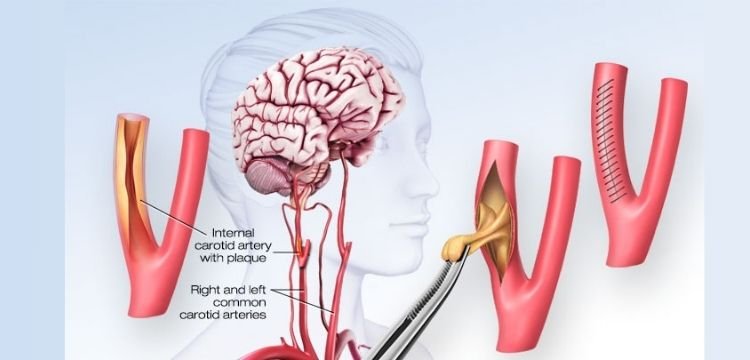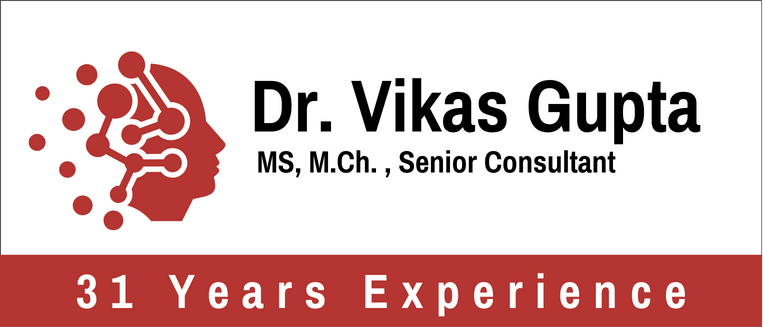
Your brain is the command center of your entire being, but have you ever considered how it obtains the oxygen it needs to function? This is where your carotid arteries work as speed lanes for oxygen-rich blood. These blood arteries ensure that the brain receives a steady supply.
Statistics say the carotid arteries provide 2,000 liters of blood to your brain daily.
However, the Carotid artery sometimes causes “clogs” in these critical pathways. It’s like a traffic jam on your brain’s oxygen motorway. This illness is a major cause of strokes, which are among the most severe health problems. Carotid artery disease is responsible for around 20% of all strokes in the United States alone.
Carotid artery surgery clears the way, ensuring oxygen gets to your brain without obstruction. But here’s the thing: even this procedure has some challenges.
Dr Vikas Gupta has consistently demonstrated an exceptional success rate in performing Carotid artery procedures. His extensive expertise and commitment to excellence have contributed to numerous patients’ positive outcomes and improved well-being, solidifying his reputation as a leading authority in the field.
This blog will discuss whether carotid artery surgery has a risk.
What Is A Carotid Artery Disease?
Carotid artery disease occurs when the arteries in the neck transport blood from the heart to the brain. This condition may be caused by a buildup of cholesterol in the arteries, known as atherosclerosis. Blood clots can develop in this area and move to the brain.
One might suffer from this ailment for a long time before noticing any symptoms. The following are the most prevalent symptoms:
- Transient ischemic attacks (TIAs), often known as mini-strokes
- Strokes occur when the blood flow to your brain is cut off or severely decreased.
- Temporary visual loss in one of your eyes
Mini-strokes and strokes are the most prevalent symptoms. When this condition is discovered because you’ve had a stroke or mini-stroke, the blood flow to your brain may be improved by taking blood thinners and cholesterol-lowering medications. However, if there’s severe narrowing to the blood vessels leading to your brain, you may need surgery to open the blood vessel.
Dr. Gupta says, “Your likelihood of needing surgery grows if you have carotid artery blockages. These occur when plaque (fatty deposits) clog the blood vessels that deliver blood to your brain and head. These blockages will increase the likelihood that you’ll have a mini-stroke or a stroke.”
What Is A Carotid Artery Surgery?
Carotid endarterectomy is a surgical procedure designed to lower the risk of stroke caused by carotid artery disease.
The carotid arteries are the major blood channels that provide oxygen and nutrients to the neck, face, and brain.
Carotid endarterectomies are performed when one or both carotid arteries become constricted due to fatty deposit buildup (plaque). Carotid artery disease or carotid artery stenosis is the medical term for this condition. A surgeon opens the blood vessel and removes the accumulated plaque during this treatment.
What Happens If You Don’t Treat Your Carotid Artery?
If a narrowed carotid artery is left untreated, blood flow to the brain may be affected. This is usually because the carotid artery becomes blocked or a blood clot forms and a piece breaks off and goes to the brain.
This can result in either:
- A stroke – a severe medical condition that can cause brain damage or death
- A transient ischaemic attack (TIA) – sometimes known as a “mini-stroke,” TIA is similar to a stroke, but the signs and symptoms are temporary and usually disappear within 24 hours.
About a quarter of strokes are caused by a narrowing of the carotid arteries.
A carotid endarterectomy can significantly reduce the risk of a stroke in people with severely narrowed carotid arteries. In people who have previously had a stroke or a TIA, surgery can substantially reduce their risk of having another stroke or TIA.
It is now thought the operation should be carried out immediately after symptoms appear. It is, therefore, essential to get immediate medical advice if you experience symptoms such as:
- numbness or weakness in your face, arm, or leg
- speech problems
- loss of vision in 1 eye
Unfortunately, there are risks associated with this operation. A stroke, heart attack, or even death are all possible outcomes. This is especially true if you are 75 or older or if you have another significant medical condition, such as diabetes or severe heart or lung disease.
How Much Does Carotid Artery Surgery in Delhi NCR Cost?
Carotid artery surgery costs in Delhi NCR range from INR 58,800 to INR 1,20,000. The minimum cost of this treatment is INR 58,800, with an average price of INR 84,000. The highest expenditure, however, is INR 1,20,000. The precise costs may vary based on the unique demands of the case, the capabilities of the chosen hospital, and any further treatments required, affecting the entire treatment.
What Can You Expect Before, During, and After Surgery?
Before Surgery:
- The patient is informed of the need for carotid artery surgery.
During Surgery:
- An incision in the neck.
After Surgery:
- Soreness in the neck for about a week.
- Initial swelling and bruising around the incision.
- Numbness in the area around the jaw and earlobe.
- Numbness improvement is expected within 6 to 12 months.
- Gradual relief from discomfort.
- Return to normal activities in about three to four weeks.
- Doctor’s guidance for resuming daily routines when comfortable.
- Need for assistance with meal preparation and housekeeping during recovery.
- Safe driving is permitted once the incision is healed and comfortable head movement is possible.
Is Carotid Artery Surgery a Serious One?
Carotid artery surgery, whether it’s carotid endarterectomy (CEA) or carotid artery stenting (CAS), is a critical medical procedure to address carotid artery disease. This condition, marked by the buildup of plaque in the carotid arteries, poses a substantial threat to one’s health. So, how serious is carotid artery surgery?
Dr. Vikas Gupta says, “The seriousness of carotid artery surgery cannot be understated, but it is matched by its potential to be life-saving. Carotid artery disease is a leading cause of strokes, which are often debilitating or even fatal. Addressing this condition through surgery is a proactive measure to prevent these catastrophic events.
While the surgery is performed precisely by experienced medical professionals, it is not without risks. CEA involves opening the carotid artery to remove plaque, while CAS inserts a stent to widen the artery. Both procedures carry the possibility of complications such as infection, bleeding, or, in the case of CEA, cranial nerve damage affecting speech and swallowing.
However, viewing these risks in the context of the risks associated with untreated carotid artery disease is essential. A severe stroke resulting from a blocked carotid artery can have devastating consequences.”
The seriousness of carotid artery surgery is, therefore, a trade-off. It’s a complex and delicate procedure with inherent risks, but it offers a crucial opportunity to prevent a potentially catastrophic event. When recommended by a healthcare professional, this surgery becomes a pivotal step in preserving and enhancing one’s quality of life. So, while it should be approached with caution and understanding, its seriousness underscores its life-saving potential.
The following patient testimonials provide valuable insights into this matter.
A satisfied patient of Dr. Vikas Gupta stated, “I was incredibly anxious when I learned that I needed carotid artery surgery. Dr. Vikas Gupta’s reassuring expertise and compassionate care put me at ease. The seriousness of the surgery was evident, but Dr. Gupta’s skill and personalized attention made all the difference. I’m now on the road to recovery, grateful for the life-saving procedure and the remarkable care I received.”
Another happy patient expressed, “Carotid artery surgery was a daunting prospect, but with Dr. Vikas Gupta by my side, I knew I was in the best hands. His 31 years of experience shone through, and his exceptional success rate provided the confidence I needed. The surgery was serious, but Dr. Gupta’s dedication to excellence and my well-being made it a life-saving journey. I can’t thank him enough for giving me a chance at a healthier future.”
Are there any Alternatives?
Carotid endarterectomy is the main treatment for narrowing carotid arteries, but sometimes, an alternative procedure called carotid artery stent placement is available.
Dr. Vikas says, “Since no incision is needed in the neck, it is a less invasive surgery than a carotid endarterectomy. Instead, a tiny flexible tube is directed to the carotid artery through a small incision in the groin. A mesh cylinder (stent) is inserted into the restricted portion of the artery to enlarge it and allow blood to flow more readily.”
Thus, it is considered a vital alternative for certain patients who would otherwise be regarded as high-risk due to other medical issues.
Conclusion
In conclusion, carotid artery surgery is undeniably a serious medical intervention, addressing the critical issue of carotid artery disease and its associated risk of strokes. While it entails risks, the severity of the procedure must be weighed against the potentially catastrophic consequences of leaving carotid artery disease untreated. In this balance, the seriousness of the surgery becomes a vital, life-preserving measure that, when performed by skilled healthcare professionals, offers the chance for a healthier, more secure future, free from the looming threat of stroke.
FAQs About Carotid Artery Surgery
Is carotid artery surgery always necessary?
Not always; it depends on disease severity and overall health.
How long does the surgery typically take?
The duration of carotid artery surgery can vary, but it usually takes a few hours.
Are there any long-term dietary or lifestyle changes after surgery?
Dietary changes, exercise, and quitting smoking may be recommended.
When is carotid artery stenting preferred over carotid endarterectomy?
Stenting is for higher-risk patients due to factors like age and health.
Can I resume normal activities after surgery, and is there follow-up care?
Yes, in a few weeks, follow-up appointments are crucial for monitoring recovery and benefits.
Read Also: Understanding Different Types of Strokes: Its Symptoms and Causes
